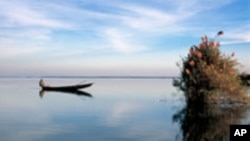A humanitarian disaster is looming, as Lake Chad shrinks. That's the warning from the UN Food and Agriculture Organization, which says Lake Chad could disappear within 20 years.
Lake Chad is surrounded by Chad, Cameroon, Niger and Nigeria. Since 1963, it has shrunk from 25,000 square kilometers to less than 1500 square kilometers. That's a 90 percent loss.
FAO Technical Officer Maher Salman says, "The impact on the livelihood of the area of Lake Chad and the significant impact on the 30 million people…suffering…that's why it's important," he says.
<!-- IMAGE -->For example, he says, "You can imagine a 90 percent decrease in the amount of water available for drinking, for agriculture, for animals. So, from that point you can tell exactly…the effect…. So, it's a matter of life in that part of the world."
That poses a food security issue for the region.
The FAO says besides the degradation of pastureland, there's also been a 60 percent decline in fish production.
"That's true, because when because when I said agriculture it doesn't mean only crops. It also means fishing. It also means…pasturelands… and it means also crops for the survival of people themselves," he says.
Contributing factors
"Some believe that it's a natural cycle. Others say it's a matter of the impact of the climate change, the climatic variability, the drought in the region and…the local use…where the competition on water is becoming larger," says Salman.
Another factor is how water resources have been managed over the years.
Can it be saved?
<!-- IMAGE -->A number of meetings have been held on saving the lake, and a number of proposals have been put forth. These include recharging the aquifer to lessen evaporation. Aquifers are underground bodies of water that can produce springs and can be tapped into for wells. They are usually recharged naturally by rainfall, but it can also be done artificially by injecting water beneath the surface
Another proposal calls for better irrigation policies to help conserve water.
However, the biggest project would actually be putting water back into Lake Chad.
"There was the proposal to transfer water from the Oubangui River to the lake," he says.
The transfer has been endorsed by the heads of state of the countries in the lake basin. A feasibility study is now being done.
The Chari and Logone Rivers were the original sources of replenishment, but the FAO says their flow has "decreased significantly in the last 40 years."
Friday, in Rome, as part of World Food Day, a special event is being held to raise awareness of the lake called: Lake Chad: A System under Threat.
<!-- IMAGE -->




